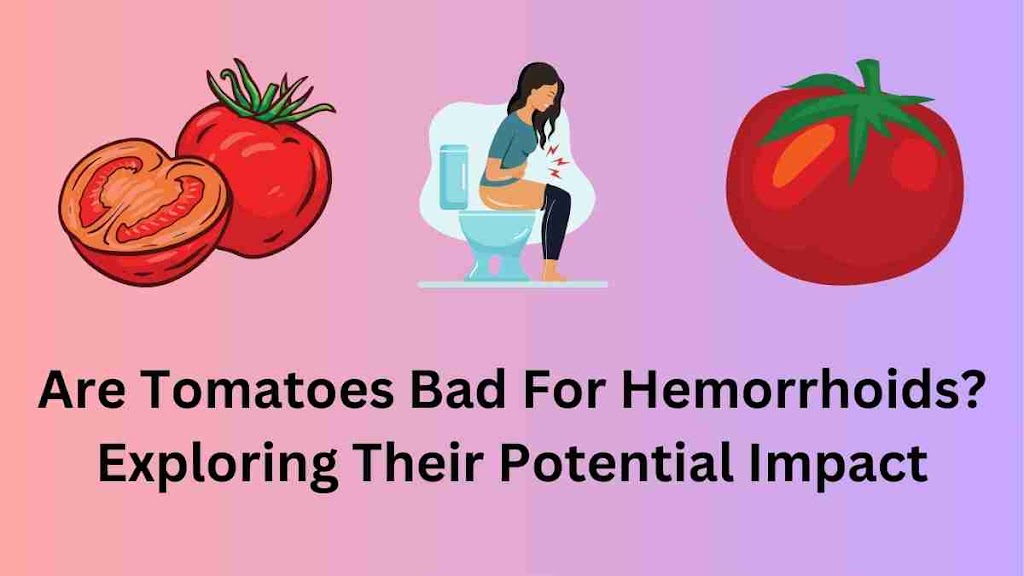Are Tomatoes Bad for Hemorrhoids? Are you suffering from hemorrhoids and wondering if tomatoes are aggravating your condition? Hemorrhoids can be a painful and uncomfortable condition, and it’s important to pay attention to your diet to avoid any potential triggers. The impact of tomatoes on hemorrhoids has been a subject of debate, as some people claim that tomatoes can worsen symptoms while others believe they can have a beneficial effect. In this article, we will delve into the relationship between tomatoes and hemorrhoids, exploring the potential risks and benefits to help you make an informed decision about including tomatoes in your diet. So, let’s find out if tomatoes are truly bad for hemorrhoids.
Are Tomatoes Bad For Hemorrhoids?
No, tomatoes are actually good for hemorrhoids. They have lycopene, vitamin C, and water, which can help reduce swelling, heal faster, and make going to the bathroom easier.
Understanding Hemorrhoids
What Are Hemorrhoids?
Hemorrhoids, also known as piles, are swollen and inflamed blood vessels that occur in the rectum or anus. They can be internal, located inside the rectum, or external, protruding outside the anus. Hemorrhoids can cause discomfort, pain, itching, and bleeding, affecting the quality of life for those who suffer from them.
Symptoms Of Hemorrhoids
Identifying the symptoms of hemorrhoids is crucial for proper diagnosis and treatment. Common symptoms include:
- Rectal bleeding, often seen as bright red blood in the stool or on toilet paper
- Itching, irritation, and discomfort in the anal region
- Pain or discomfort during bowel movements
- A lump or swelling near the anus
Causes And Risk Factors
Hemorrhoids can be caused by various factors, including:
- Straining during bowel movements
- Chronic constipation or diarrhea
- Prolonged sitting or standing
- Pregnancy and childbirth
- Obesity or overweight
- A sedentary lifestyle with lack of exercise
The Role of Diet in Hemorrhoids
Importance Of A Balanced Diet
Maintaining a healthy and balanced diet is vital for preventing and managing hemorrhoids. A well-rounded diet ensures that the body receives essential nutrients, supports proper digestion, and helps maintain regular bowel movements.
Fiber-rich Foods
Fiber plays a significant role in preventing and alleviating hemorrhoids. Including fiber-rich foods in your diet helps soften the stool, making it easier to pass through the digestive system. Some examples of fiber-rich foods include:
- Whole grains (such as oatmeal, brown rice, and whole wheat)
- Fruits (such as apples, berries, and prunes)
- Vegetables (such as broccoli, spinach, and Brussels sprouts)
- Legumes (such as beans, lentils, and chickpeas)
Hydration
Staying hydrated is crucial for maintaining healthy bowel movements and preventing constipation, which can contribute to the development of hemorrhoids. Drinking an adequate amount of water throughout the day helps keep the stool soft and facilitates its passage.
Avoiding Trigger Foods
While some foods can promote regular bowel movements and alleviate hemorrhoids, others can worsen the condition or trigger flare-ups. It is essential to be mindful of certain foods that may not be suitable for individuals with hemorrhoids. Tomatoes, although nutritious, may cause irritation in some individuals, possibly worsening hemorrhoid symptoms.
Exploring the Nutritional Composition of Tomatoes
Tomatoes: A Rich Source Of Nutrients
Tomatoes are not only known for their vibrant color and delicious taste, but they also pack a powerful nutritional punch. These luscious red fruits are an excellent source of essential vitamins, minerals, and antioxidants.
1. Lycopene: The Powerhouse Antioxidant
Tomatoes are particularly renowned for their high content of lycopene, a potent antioxidant that gives them their characteristic red color. Lycopene has been linked to various health benefits, including reducing the risk of certain cancers, improving heart health, and protecting against UV damage.
2. Vitamins and Minerals
In addition to lycopene, tomatoes contain a variety of essential vitamins and minerals. They are an excellent source of vitamin C, which boosts the immune system and promotes collagen production for healthy skin. Tomatoes also provide a good amount of vitamin K, potassium, and folate.
3. Fiber for Digestive Health
Tomatoes are a good source of dietary fiber, which plays a crucial role in maintaining a healthy digestive system. Fiber helps regulate bowel movements, promote satiety, and support overall gut health. Including tomatoes in your diet can contribute to a balanced and wholesome digestive function.
Potential Benefits Of Tomatoes For Health
Aside from their impressive nutritional profile, tomatoes offer a range of potential health benefits that make them a valuable addition to any diet. Here are a few key advantages:
1. Cardiovascular Health
Studies have suggested that consuming tomatoes regularly may contribute to improved heart health. The high levels of lycopene and other antioxidants in tomatoes may help lower LDL cholesterol, reduce inflammation, and improve overall blood vessel functionality, ultimately reducing the risk of heart disease.
2. Cancer Prevention
The abundance of lycopene in tomatoes has been linked to a lower risk of certain types of cancer, such as prostate, lung, and stomach cancer. Lycopene’s powerful antioxidant properties help neutralize free radicals and protect cells from DNA damage, potentially reducing the risk of cancer development.
3. Vision and Eye Health
Tomatoes contain several compounds that are beneficial for eye health. The lutein and zeaxanthin found in tomatoes are essential carotenoids that contribute to maintaining good vision and preventing age-related macular degeneration.
4. Skin Health and Anti-Aging
The antioxidants present in tomatoes, including lycopene and vitamin C, can help protect the skin from UV damage and oxidative stress. Regular consumption of tomatoes may improve skin texture, promote collagen production, and reduce the appearance of fine lines and wrinkles.
The Relation between Tomatoes and Hemorrhoids
Does Tomato Consumption Aggravate Hemorrhoids?
Tomatoes, often hailed for their nutritional benefits, have been the subject of speculation when it comes to their impact on hemorrhoids. While there is no direct evidence to suggest that tomato consumption aggravates hemorrhoids, certain factors need to be considered.
The Fiber Factor
One aspect that may affect hemorrhoids is the fiber content in tomatoes. Fiber plays a crucial role in maintaining digestive health and promoting regular bowel movements. However, if you already suffer from hemorrhoids, a high-fiber diet, including tomatoes, can potentially strain and worsen the condition. It is essential to strike a balance and assess your individual tolerance to fiber-rich foods.
The Acidic Connection
Another consideration is the acidic nature of tomatoes. Some individuals with sensitive digestive systems or existing gastrointestinal issues may experience discomfort when consuming acidic foods like tomatoes. Although there is limited scientific evidence suggesting a direct link between tomato acidity and aggravated hemorrhoids, it is advisable to listen to your body and make adjustments accordingly.
Impact Of Tomatoes On Digestive Health
Beyond the potential effects on hemorrhoids, tomatoes can actually benefit overall digestive health when consumed in moderation.
Nutritional Value
Tomatoes are rich in essential vitamins and minerals, including vitamin C, potassium, and antioxidants. These nutrients contribute to supporting a healthy digestive system and bolstering immune function. Incorporating tomatoes into a well-balanced diet can help maintain a healthy gut.
Anti-Inflammatory Properties
Tomatoes are known for their anti-inflammatory properties, thanks to the presence of lycopene, a powerful antioxidant. This element helps reduce inflammation in the body, including within the digestive tract. By reducing inflammation, tomatoes may indirectly alleviate discomfort related to hemorrhoids.
Factors to Consider for Hemorrhoid Sufferers
Dietary Recommendations For Hemorrhoids
1. High-Fiber Foods
Incorporating high-fiber foods into your diet is essential for managing hemorrhoids effectively. Fiber helps to soften stools, making them easier to pass and reducing strain during bowel movements. Some excellent sources of fiber include:
- Whole grains
- Fruits and vegetables
- Legumes
By including these foods in your diet, you can regulate your bowel movements and decrease the likelihood of developing or worsening hemorrhoids.
2. Hydration
Adequate hydration is crucial for hemorrhoid sufferers. Drinking enough water helps to soften stools and prevent constipation, which can aggravate hemorrhoids. Aim to consume at least eight glasses of water per day and limit the intake of dehydrating beverages, such as caffeine and alcohol.
3. Avoid Spicy and Acidic Foods
Spicy and acidic foods have been known to irritate the digestive system, potentially exacerbating hemorrhoid symptoms. It is advisable to steer clear of foods such as chili peppers, citrus fruits, and tomatoes, as they may cause discomfort and irritation. However, it is important to note that individual reactions can vary, so it is best to pay attention to your personal triggers.
Managing Hemorrhoids With A Balanced Diet
1. Include Anti-Inflammatory Foods
Incorporating anti-inflammatory foods into your diet can have a positive impact on managing hemorrhoids. These foods help reduce inflammation and soothe discomfort. Some examples of anti-inflammatory foods include:
- Fatty fish like salmon
- Leafy greens such as kale and spinach
- Blueberries and strawberries
By including these foods in your balanced diet, you can potentially alleviate some of the symptoms associated with hemorrhoids.
2. Limit Processed Foods
Processed foods are often high in unhealthy fats and sugars, which can lead to constipation and worsen hemorrhoid symptoms. Try to reduce your intake of processed foods and instead opt for whole, unprocessed foods. This change in your diet can promote regular bowel movements and reduce strain during defecation.
3. Maintain a Healthy Weight
Being overweight or obese puts additional pressure on the veins in the rectal area, increasing the risk of developing or worsening hemorrhoids. By maintaining a healthy weight through a balanced diet, you can reduce the strain on your veins and potentially alleviate hemorrhoid symptoms.
Practical Tips for Hemorrhoid Sufferers
1. Healthy Lifestyle Habits For Hemorrhoid Management
Incorporating healthy lifestyle habits can significantly help in managing and reducing the discomfort of hemorrhoids. By making the following changes, you can alleviate symptoms and improve your overall well-being:
- Stay hydrated: Drinking an adequate amount of water throughout the day helps to soften stools and prevent constipation, which can aggravate hemorrhoids.
- Eat a high-fiber diet: Fiber-rich foods such as whole grains, fruits, vegetables, and legumes promote regular bowel movements, reducing the strain on the rectum during bowel movements.
- Engage in regular physical activity: Regular exercise, such as walking or swimming, can help stimulate the digestive system, prevent constipation, and promote healthy blood circulation.
- Avoid prolonged sitting or standing: Sitting or standing for extended periods can increase pressure on the rectal area, worsening hemorrhoid symptoms. Remember to take breaks and change positions frequently.
- Maintain proper hygiene: Clean the anal area gently with mild, unscented cleansers after bowel movements. Avoid using harsh soaps or rough toilet paper, as they can irritate the hemorrhoid area.
- Avoid straining during bowel movements: Straining puts unnecessary pressure on the rectal area. To prevent straining, try not to hold in bowel movements and respond promptly when the urge arises.
2. Advice For Incorporating Tomatoes Into A Hemorrhoid-friendly Diet
While tomatoes themselves do not pose a significant risk to hemorrhoids, certain factors surrounding their consumption may trigger or exacerbate symptoms in some individuals. Here are some tips for incorporating tomatoes into a hemorrhoid-friendly diet:
- Choose ripe tomatoes: Ripe tomatoes are generally easier to digest than unripe ones. Opt for ripe, softer tomatoes to reduce the chances of irritation.
- Limit acidic tomato products: Highly acidic tomato products, such as tomato sauce or tomato juice, may irritate the digestive system, potentially aggravating hemorrhoids. Moderation is key when consuming these products.
- Try cooked or processed tomatoes: Cooking or processing tomatoes can help break down the fibers and make them easier to digest. Consider incorporating cooked or processed tomato products, like canned tomatoes or tomato paste, into your diet.
- Monitor your individual tolerance: Every individual may react differently to certain foods, including tomatoes. Pay attention to your body’s response and adjust your diet accordingly. If you notice that tomatoes worsen your hemorrhoid symptoms, it may be best to avoid or limit their consumption.
Adopting healthy lifestyle habits and being mindful of your diet can greatly contribute to managing hemorrhoids. By incorporating these practical tips, you can alleviate discomfort and improve your overall well-being. Remember to consult with a healthcare professional for personalized advice and guidance.
Frequently Asked Questions For Are Tomatoes Bad for Hemorrhoids?
Is Tomato Good For Hemorrhoids?
Tomatoes are generally not bad for hemorrhoids. In fact, they are an excellent source of nutrients and can be beneficial for overall digestive health. However, it is important to note that tomatoes are slightly acidic in nature, which may cause some discomfort if you have sensitive hemorrhoids. It is always recommended to listen to your body and consult with your doctor or healthcare professional to determine if tomatoes or any other food is suitable for your specific situation.
What Foods Should Be Avoided With Hemorrhoids?
When dealing with hemorrhoids, it is advisable to avoid certain foods that may aggravate the condition. These include spicy foods, greasy or fried foods, caffeine, alcohol, and processed foods high in added sugars. These foods can contribute to constipation, inflammation, and irritation, making the symptoms of hemorrhoids worse. Instead, opt for a diet rich in fiber, whole grains, fruits, vegetables, and plenty of water to promote healthy bowel movements.
What Food Shrinks Hemorrhoids Fast?
While there is no food that can magically shrink hemorrhoids overnight, certain foods can help in promoting healing and reducing discomfort. Including high-fiber foods in your diet such as whole grains, fruits, and vegetables can help soften the stool and ease bowel movements, which can provide relief from hemorrhoids. Additionally, foods rich in bioflavonoids, such as citrus fruits, berries, and dark leafy greens, may help strengthen blood vessels and reduce inflammation.
What’s The Worst Thing For Hemorrhoids?
The worst thing for hemorrhoids is prolonged sitting or straining during bowel movements. These actions can put excessive pressure on the veins in the rectal area, leading to the development or worsening of hemorrhoids. It is important to avoid sitting or standing for long periods and to take breaks to move around and relieve pressure. Additionally, straining during bowel movements should be avoided by adopting healthy lifestyle habits such as eating a high-fiber diet, staying hydrated, and exercising regularly.
Does Tomato Sauce Affect Hemorrhoids?
The impact of tomato sauce on hemorrhoids may vary from person to person. Tomato sauce, especially if it contains additives, may cause digestive issues or irritation in some individuals, which could potentially worsen hemorrhoid symptoms. It is advisable to monitor your own body’s reaction to tomato sauce and if you notice any discomfort or aggravation of your hemorrhoids, it may be best to avoid or limit your intake of tomato sauce and opt for milder alternatives.
Conclusion
When it comes to the question “Are tomatoes bad for hemorrhoids?”, it is important to consider all factors before drawing any definitive conclusions. While there is no direct evidence suggesting that tomatoes are inherently detrimental to individuals with hemorrhoids, it is widely advised to exercise caution and moderation when consuming this fruit. Tomatoes are known to be rich in certain compounds that may cause irritation or inflammation in sensitive individuals. To alleviate any potential discomfort, it is recommended to consult with a healthcare professional, who can provide personalized recommendations based on your specific condition.




